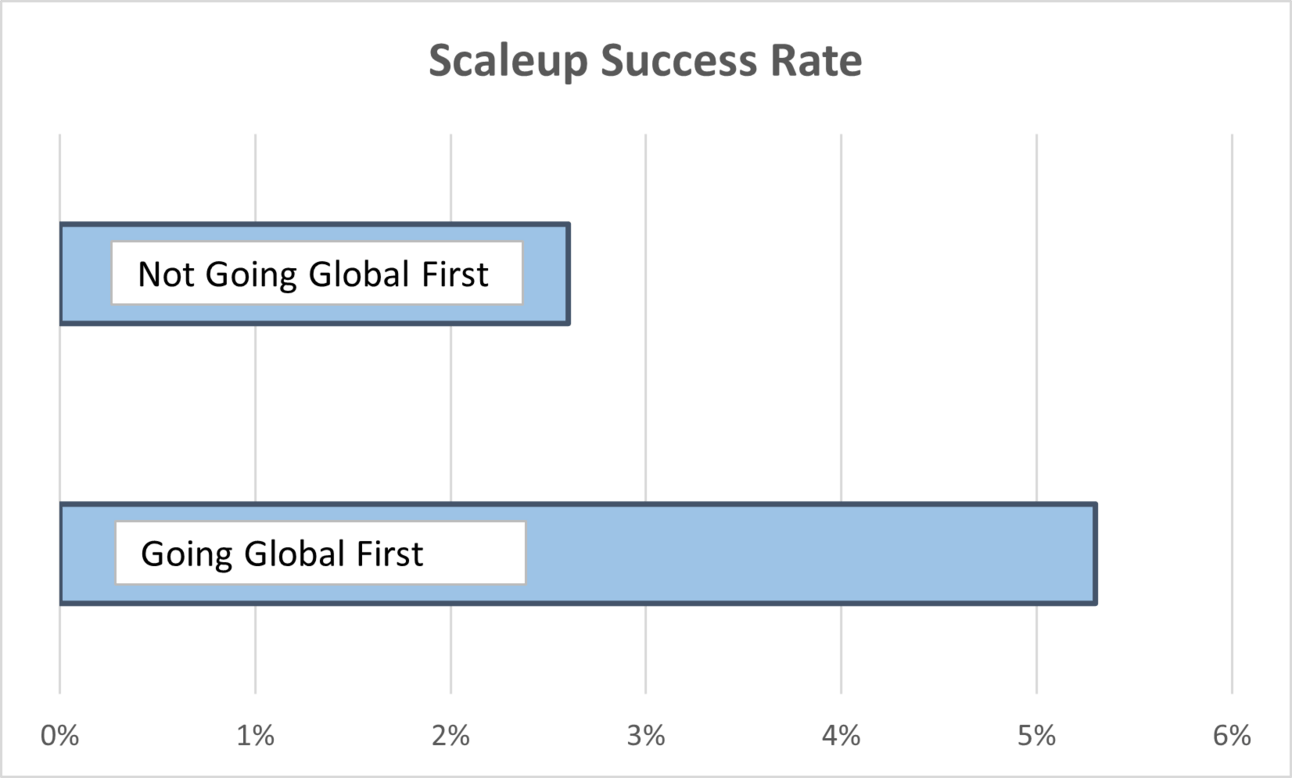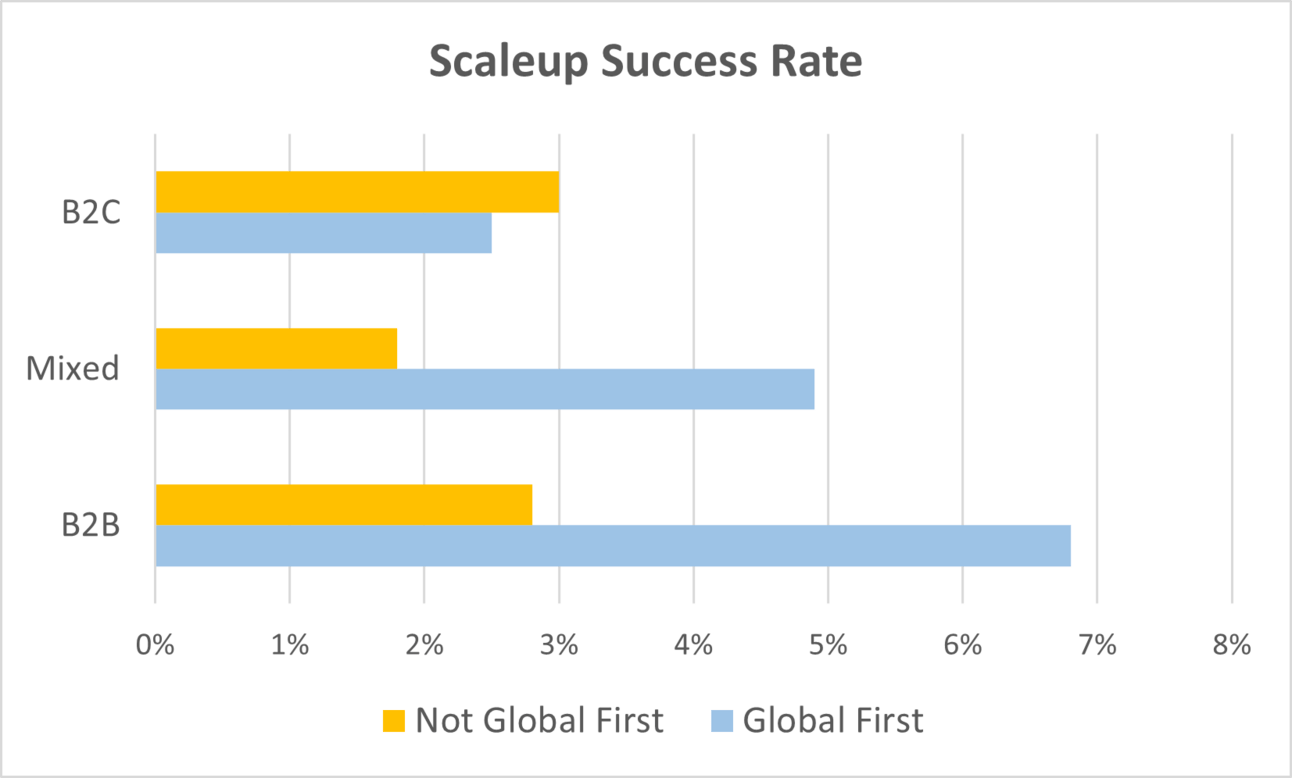
It’s common knowledge you develop your local market first.
Goldman Sachs is the global leader in mergers and acquisitions advice. One lesson I learned there is that you don’t outgrow a problem. Deals and international expansion aren’t a cure for domestic troubles.
Yet the evidence shows that startup businesses targeting international sales grow twice as fast as those that don’t. How does that work?

Source: Startup Genome
How to Go Global
There is a world of difference between starting out global and turning to international sales when domestic growth falters.
Research from Startup Genome covering 100,000 companies in 40 countries shows that faster growth is achieved by those who target international markets from the outset.
The key word is target. Dreaming of taking over the world won’t deliver anything. Success requires meticulous preparation, networking and product design.
There are three things you must do to go global. Steve Blank and Eric Ries of the Lean Startup Movement have preached these simple steps for over a decade.
Meet a Need
You must identify an unmet need. This is the case whether you stay local or go international. The bigger the market the more likely you are to find a niche that will allow you to scale.
Arnold Schwarzenegger got into body building in Austria. But where his gym buddies targeted the national competitions, he pursued European-wide success from the start. He was doing the same amount of work so why not target the bigger prize. Arnie was Mr. Europe before the age of 20.
Target a Market
Next you fixate on a market that you understand, have access to and connections with. It is essential that you understand the culture of the country you choose. Startup Genome shows that having advisers with experience in the US and UK is most beneficial in this process.
The exception to this rule is when you’re in the US. This is the best market to target if you are going international and hence the place to stay if you’re already there. If not, don’t worry.
Fewer than 2% of successful scaleups are built in Silicon Valley but most sell into the US. This is a huge market where companies have experience working with startups and understand the power of disruption.
Many other markets lack this corporate culture because protectionism and localism strangle startups at birth.
Develop a Product
The final step is to develop a product that meets the unmet need in your target market. Given cultural, regulatory and practical differences between countries, targeting international growth forces you to build a flexible product and sales process.
You are not going to win if you export your local market solution and do not adapt. You won’t succeed if you think your domestic marketing strategy works everywhere. And there are important cultural norms to observe when selling in different countries.
Again this is where having international experience on your staff or among your advisers pays dividends.
When I built trading software we worked with an Edinburgh based operation that was part of a global network. The product champion at the client pushed us to work with his international colleagues. We realised quickly the markets that they traded operated differently from those in Europe.
Consequently, we pared back our offer, focused on universal features and built flexibility into the user experience. This both sold better and was cheaper to maintain.
Don’t Go Global if…
The data shows that B2B companies are most successful scaling through international sales.

Source: Startup Genome
There are significant cultural obstacles in consumer behaviour that result in many B2C products not selling overseas. This is particularly challenging for Asian startups due to language barriers and distance from Western markets.
The most successful Asian scaleups have less than 20% overseas sales, especially in large domestic markets such as China and India.
It is extremely difficult to build internationally if you lack experience. If you’re based in a startup hub with limited international know-how then your access to the appropriate advice and talent is limited. You must build your network before venturing overseas.
What to Do Next
The fastest growing B2B startups outside of America target over 50% international sales. This is especially so in Europe, Israel and Oceania.
Going global forces a flexible approach to product design, sales and customer service that serves you well in any market.
Wherever you are based consider this three-step challenge:
Review the design of your product. Is it flexible in terms of user experience, delivery mechanism and compatibility with different technology stacks?
Research a market. Does it have similar challenges to the ones you solve, is there a gap in the market and how large is the opportunity?
Use your network. Contact people you know and ask each one for three introductions to a founder, an investor or an adviser in an overseas market.
Sign up for The Profit Elevator for weekly tips on how to scale your startup. If you enjoyed this edition please share it with one or two friends.
